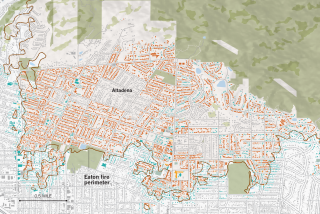California’s top court rules in favor of Gov. Brown’s water project

- Share via
The California Supreme Court cleared the way Thursday for state water authorities to do environmental and geological testing on private land for a proposed project to divert Sacramento-San Joaquin Delta water to the south.
The ruling capped six years of litigation by delta property owners, who challenged the state’s right to enter their land without compensation.
In a decision written by Chief Justice Tani Cantil-Sakauye, the court said state water authorities could proceed with testing — subject to various conditions — on more than 150 properties.
The ruling overturned a state appeals court decision that favored the delta owners but also gave property owners more rights than they had previously under state law.
The state will have to obtain a court order prior to geological testing, the decision said, and the trial court may limit the exploration to protect the interests of the owners.
The trial court also may require the state to deposit an amount that the court decides is sufficient to cover any likely damage and allow the owner to seek compensation before a jury for losses, including restricted use of the property.
Thomas H. Keeling, who represented dozens of landowners in the case, said he had hoped for a ruling that would send a strong message to the government about protecting the rights of private property.
Thursday’s decision, he said, would leave California landowners vulnerable to “aggressive tactics” by state agencies.
Still, he said, he was pleased that the court decided that owners had a right to seek jury compensation for the loss of use of their property and damage. State law previously had not included that right, and rather than overturn the law as unconstitutional, the court added that provision.
The proposed project “would leave the delta, the largest estuary on the west coast of America, as a saline area and make it very difficult to farm,” he said. “The farmers in the delta will suffer immensely if these tunnels are ever built.”
The project, backed by Gov. Jerry Brown, would have to be approved by various agencies. Keeling said reviews and planning would take years.
The state has said that it might later acquire the properties, either through voluntary sales or eminent domain, and that it needed to map and survey the properties for plant and animal species, habitat, soil conditions, hydrology and other resources.
On 35 of the properties, the state has intended to do geological testing that involved drilling deep holes to determine subsoil conditions.
“The department is not seeking to obtain title to private property, to permanently maintain bored holes on the landowners’ property, or to obtain exclusive possession of any portion of the property for a significant period of time,” Cantil-Sakauye wrote.
Ted Thomas, a spokesman for the California Department of Water Resources, said the ruling was a significant victory for the project.
“It retains our momentum in increasing water supply reliability while protecting and enhancing the Delta ecosystem,” he said.
Times staff writer Bettina Boxall contributed to this report.
Twitter: @mauradolan
ALSO
Judge opts not to penalize L.A. over destruction of documents
Judge refuses to halt subway project after Little Tokyo mall lawsuit
‘Heat Dome’ stretches to Southern California, causing temperatures to soar over 100
More to Read
Sign up for Essential California
The most important California stories and recommendations in your inbox every morning.
You may occasionally receive promotional content from the Los Angeles Times.










